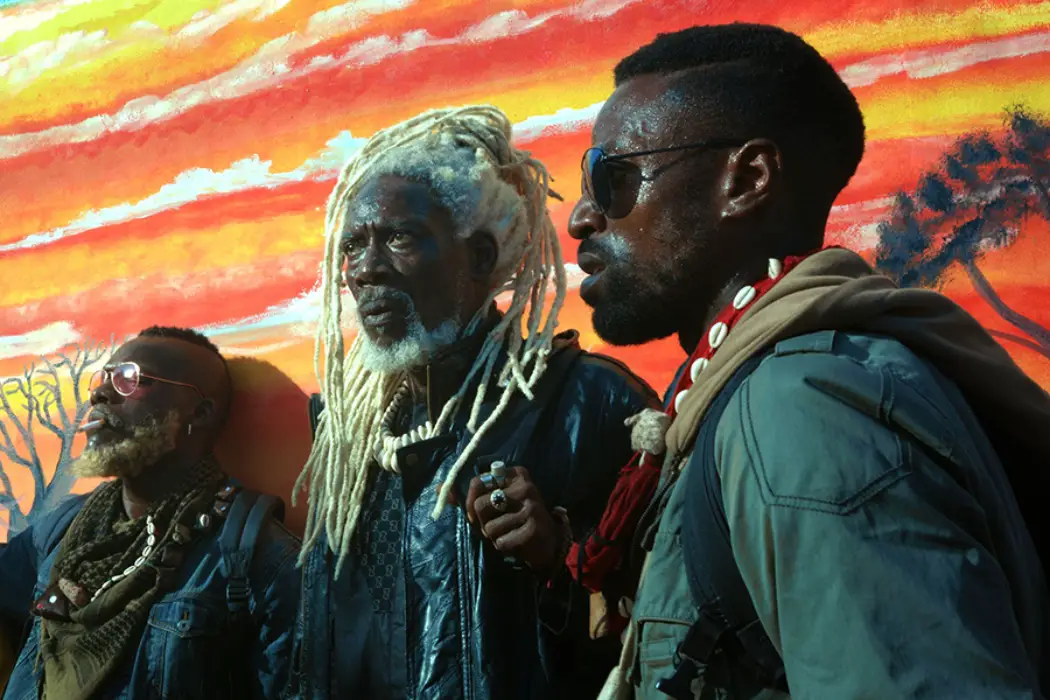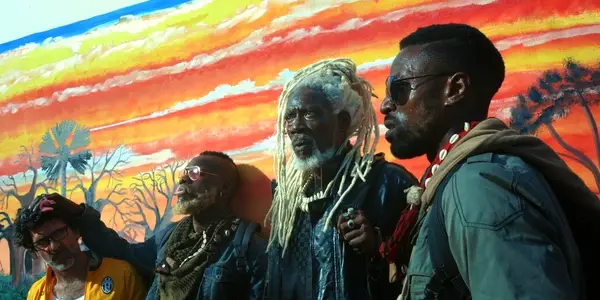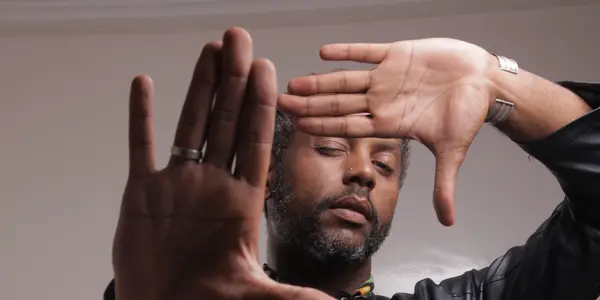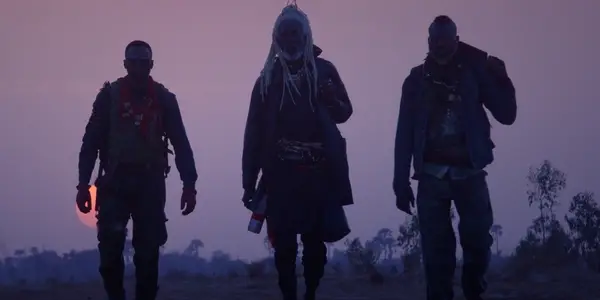TIFF 2021: SALOUM Director Jean Luc Herbulot On Creating A New Wave Of African Cinema

Monique Vigneault is a Mexican-Canadian film critic. She regularly covers…
The 2021 edition of the Toronto Film Festival kicks off today. Entering the scene is a piece of cinema that transcends, what the director himself says, is ‘whatever the f*ck genre means’ and celebrates the cinematically unexplored corners of West Africa. It fuses and borrows from westerns, noir, horror, Senegalese folklore and other influences.
Saloum, the first feature film from the new Pan-African distributor, Lacmé Studios, is a frenetic, frenzied adventure into the Sine-Saloum region of Senegal. Starring a Herbulot favourite, Yann Gael, who starred alongside Issaka Sawadogo in Herbulot’s Canal+ hit Sakho & Mangane, the film follows a band of mercenaries who pick up for Senegal during the coup d’état in neighbouring Guinea-Bissau. It is a film that resists a simple, trite synopsis and is better left experienced.
The Point-Noire native sat down with Film Inquiry to discuss his ambitions for the film, the future of African cinema, and his cinematic roots ahead of the worldwide Midnight Madness premiere.
Monique for Film Inquiry Salut Jean Luc! Thank you for being here virtually today and congratulations on the Midnight Madness premiere of Saloum at TIFF!
Jean Luc Herbulot: Bonjour Monique! Thank you, it’s my first time at TIFF, so I’m excited. We’ll see how the premiere goes.
Saloum really surprised me. It’s a film that connects horror and political intrigue, and we meet our anti-heroes, the Hyenas, as they’re fleeing Guinea in a coup d’état for Senegal. There are elements of African folklore, packaged in the stylized aesthetic of pulp movies. The result is a kind of cinema that’s entirely new. Where did the inspiration for this film come from, in particular, characters like Chaka, Rafa and Midnight?
Jean Luc Herbulot: I think we’ve been smoking too much weed in Saloum. That’s what it is. [laughs] Now, more seriously, Pamela Diop, the producer, and I went to Saloum because she wanted to introduce me to the Saloum region in Senegal. She’s half French and Senegalese and I’m half French and Congolese, so I’m not Senegalese. So I was discovering, and then I just fell in love with the region. It was so wild and so wide. Because what you see in the movie, and I’m not joking, it’s like one tenth of Saloum. So it’s a very big, very, very, very, various type of landscape. So our problem was more, okay, how do we contain this movie and natural environment?
And the main influences? Well, I’m going to be honest, they’re more video games and movies. Because the weird thing was, when I was preparing and writing the movie, I was just playing video games and not watching any movies. It was a conscious act, because I really wanted to experiment with zero interference from movies I like. Of course, you always inject whatever you like, and it can be unconscious.

For the conscious part, I should thank Red Dead Redemption and Metal Gear Solid for whatever influence you’ll find there. And of course, I’m very keen about African history and African geopolitics. Because everything is linked, especially in this story. So I wanted the genre to be balanced with something that is very grounded. When you start the movie in Guinee-Bissau in 2003, that’s exactly what happened in 2003 in Bissau. The only thing where I cheated a bit is that the drug arrived in 2005.
But outside of that, everything that you see in the movie, the political stuff, the army, and even that legend about the curse, it’s in folklore, it exists.
Saloum really challenges the current representation of West African cinema in France and around the world. This kind of movie is something we haven’t really seen. The way it mixes folklore and the supernatural with the narrative reminds me of Mati Diop’s Atlantiques, but I can’t say I’ve seen this style anywhere else.
With Lacmé Studios, your distributor with Pamela Diop, is your aim to create a new wave of cinema? What was the idea behind the initiative?
Jean Luc Herbulot: I’ve been working in Africa now for, what, four years? I was born in Africa, I grew up here, and studied in France. And after that, I spent four or five, if not six years in Los Angeles working in the business trying to make movies but it wasn’t working. But at the same time, it was my education to understand the business, same thing with France.
So just looking around me, I was like, ‘Ok, what’s missing?’
And I just turned to Africa, and I was like, ‘That’s missing.’ Yeah.
The myths there are the myths that I’ve grown up with, the heroes that I didn’t have, the stories, the political elements that you have in Africa, they’re all passionate and fascinating. And we have like fifty countries in Africa. So you have like, fifty possibilities of whatever you want to do. So Senegal was one of them.

I grew up with American movies and I’m a big, big fan of Korean movies, so I wanted to make a genre film. Our goal was, let’s make something we’ve never seen. That’s it. So we tried. [laughs] And after that, the challenge was finding the person with the right, taste, if that makes sense. Because it’s so easy to work on a big movie that’s quite mainstream in a way. But when you’re trying to do something new, especially in Africa, and you bring some teams that are not from Africa, and you try to keep that vibe, well, that’s when it becomes difficult. But that’s also when the richness is coming. That’s what happened. Shooting in Africa, and after that, doing the post-production in France, and doing another part in South Africa, and others here and there, then having American partners and French partners, became like, lots of people wanting to do something for Africa and wanting to see something new.
We all want to do something new. Let’s hope we succeeded somewhere on that.
For Lacmé, we created the company, Pamela and I, because we were just tired of not seeing heroes in Africa and not seeing stuff that was inspiring us. So the main goal with Lacmé is to inspire a generation about what we can do in Africa. We have Saloum but we also have a big lineup of other stuff. Not just genre movies, but also different types of genres. The main goal has always been creating heroes and creating inspiration for everybody. We want people to start seeing Africa as an opportunity and not just, oh, it’s difficult to shoot there, oh my god, they have war there, they have sickness, blah, blah, blah. That’s just a face of it, you know. That’s the thing we want to put on the face of the world, if we can do it: to take some local stories and make them global.
No, I definitely agree. I mean, I’m half Mexican, and so I know what you’re talking about. For a while, it’s like you just see drug dealers, you see that horrible yellow filter the Americans throw on blockbusters. But then a few directors sort of introduced a new wave in the 2000s, so I definitely think it’s possible.
Jean Luc Herbulot: Yeah. [laughs] But now you guys have those three guys [Iñárritu, Cuarón, Del Toro] that are taking Oscars every year, so give us our place! [laughs]
Yeah, totally, I agree!
Jean Luc Herbulot: But you know what I’m talking about, right? You guys are too much! I started directing when I saw Amores Perros, and I knew at that moment that it was in Mexico, but I had never been in Mexico at that moment in my life. But I was like, if they can do that in Mexico, they can do that in Africa! You know, and that’s part of my inspiration. When we started to work in Africa, it’s these kinds of directors who represent a new wave, but at the same time, a country or a place in the world.
I think it’s a great initiative. I also wanted to know about the cinematography, just because I thought it was so unique, I really haven’t seen something like that. The way it plays together with the costume design, it’s very cool. How did you know you wanted to work with Gregory Corandi on cinematography?
Jean Luc Herbulot: Gregory! It was quite a challenge for him because it was his first movie. This was his first film, we did three, four, short films together. And after these shorts, he went to work at a local, how do you say, travail dans un magasin d’occasion de matériel? (Second-hand equipment store)
And I just saw talent wasted. Not wasted, because you’re learning while you’re working there, but at the same time I was like, man, you need to shoot. And when I was presenting the Saloum project, he was like, ‘I’m coming, even if I’m not paid, I’m coming, I don’t give a shit.’

So he came, and we spent a week in Saloum trying to, you know, look at the lighting and the best hours and locations and stuff like that. And we, like every director and cinematographer, we worked our ass off and the great thing was, since we were all, sleeping in the camp — so the camp that you see in the movie is, it’s our rooms, basically — and Gregory was sleeping in the same cabin as me everyday. He went to Saloum, he saw it, and he conquered it, you know?
After that, for the costumes and the art direction, I’ve been working with some people in Morocco and I’m also a graphic designer at the very core. I wanted to be a comic book artist, so I’m coming from this world. And I love clothes. I love colours, I love what colour says. For example, the red has a bigger importance in the movie, so stuff like that. I’m very perfectionist on some details.
Since you have such a unique professional background, directing, writing and graphic design, what was your journey into cinema?
Jean Luc Herbulot: That’s an interesting question. It was a long one. I didn’t want to be a director the first time. I’ve always loved movies, but I never thought I would work in that industry. Because I always felt like it was a rich people sport. And I was born in Africa, in Congo, so obviously, there was no movie industry at that moment. So I used to draw, I worked in music, composing music, I worked in video games, which are also a big part of my life. And then somewhere in my life, in an editing course in university, I realized, ‘Okay, movies.’ It’s about mixing all these things I love, drawings, music, and rhythm, and playing with the audience. So I was trying to find everything I like in movies, and I thought, why not try. And the first time that I tried it was a short movie. It won a lot of festivals in France, and I thought that was interesting. I never won anything in my life. So it came, like, a cherry on the cake.
It’s great. It’s like a pastiche, kind of.
Jean Luc Herbulot: Yeah! It’s a big pastiche, I love the word.
Jean Luc, thank you so much. Best of luck with the premiere.
This interview was edited and condensed for clarity.
Film Inquiry would like to thank Jean Luc Herbulot for taking the time to speak with us!
Saloum will have its World Premiere at the 2021 Toronto International Film Festival on Tuesday, September 14, 2021, as part of the Midnight Madness slate.
Does content like this matter to you?
Become a Member and support film journalism. Unlock access to all of Film Inquiry`s great articles. Join a community of like-minded readers who are passionate about cinema - get access to our private members Network, give back to independent filmmakers, and more.
Monique Vigneault is a Mexican-Canadian film critic. She regularly covers world cinema on the festival circuit.













